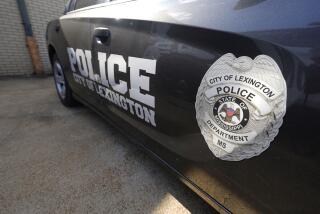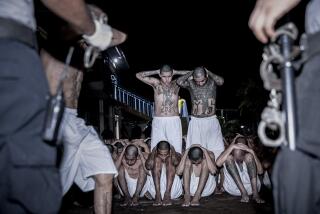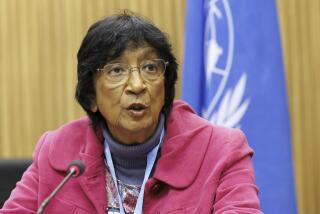S. African Police Accused of Child Torture, Killing
JOHANNESBURG, South Africa â An American human rights monitoring group charged Thursday that among the thousands of black children arrested over the past year some as young as 10 have been tortured and more than 200 killed by South African police in their efforts to crush opposition to the minority white government.
The New York-based Lawyersâ Committee for Human Rights concluded in a detailed and documented report of police and army brutality against black children that, âfar from being spared the brunt of repression, these children have often been singled out as special targets of state-sanctioned violence.â
Using figures compiled from government reports, the group notes that 209 children under 16 were killed in the sustained civil unrest here from January, 1985, through mid-February, 1986, and that 2,106 were detained without charge under the state of emergency from July to March, a full 25% of all those held.
Even more alarming to the monitoring group, however, was the pattern of frequent and widespread torture of children as young as 10 and 11 by the police. More than 30 cases are cited in the report of children who were beaten, whipped, abused sexually, deprived for days of sleep and food and tortured with electric shocks.
Burned, Cut, Shocked
For instance, Joseph, 14, whose last name was withheld in the report for his protection, says he was arrested while playing soccer and held for nine days at an army camp. He said soldiers had burned him with cigarette lighters, cut him with broken bottles and shocked him repeatedly with electric current. His hands were twisted and blackened from the shocks, the report said, and his body badly scarred from the burns and cuts inflicted on him.
âA white soldier took my right arm and bent it behind my back,â the report quotes Joseph as saying as he recalled the start of his interrogation at the camp. âHe then took out a lighter, and he held it beneath the wrist of my right hand. . . . I could smell my flesh burning.â
Later, the soldiers used electric current to shock him, Joseph said. A wire would be tied around his right hand, water was poured on him and he was given electric shocks.
âEach time my body would convulse with the shocks,â he recounted. âIt ripped out my thumbnail and took a chunk of flesh out of my thumb.â
Another boy, Eugene Vusi Dlamini, told how he had been beaten by six policemen after his arrest.
Kicked in Stomach
âThey covered my face and mouth with a piece of (rubber inner) tube, and then they kicked me in the stomach,â he said in a sworn statement. âThen they punched me in the stomach with clenched fists. I lost consciousness.â
He was then blindfolded, tied to a chair, hand and foot, doused with water and then shocked with electric current.
Ditwe, 15, whose last name also was not given in the report, said that after his arrest he was kicked, beaten and whipped until he bled. Both of his arms were broken, and the plastic whips cut so deep that they left deep slashes on his chest and back. He was not allowed to see a doctor until after his release five days later.
Zukizani, 16, told how police would repeatedly lift him spread-eagled into the air and then drop him on the floor. While he was on the floor, a policeman would stand on his stomach or back.
Of the 12 people who died while detained under South Africaâs security laws last year, three were minors, according to the report.
While acknowledging that black youths, many in their teens, were in the forefront of anti-apartheid rioting over the past year and a half, the report says that the security forcesâ ânet has been cast so widely and indiscriminatelyâ that their clear intention is to âcontrol, intimidate and incarcerate those involved in political protest.â
Police Disclaim Abuses
South African police headquarters in Pretoria said in reply Thursday that âthe security forces do not tolerate or condone any abuses or illegal actions against the civilian populationâ and rejected the reportâs charges of torture and wholesale roundups of black youths. A police spokesman said that any complaint making specific allegations would be investigated.
The 184-page report, entitled âThe War Against Children: South Africaâs Youngest Victims,â was compiled by a British lawyer, Helena Cook, who interviewed many of the victims herself and worked with human rights groups here to investigate other cases. Bishop Desmond Tutu, the 1984 Nobel Peace laureate, describes it in a foreword as âa clinical account, well-documented and researched, of what has been happening to children who have been the victims of violence. . . . â
The report criticizes the Reagan Administration for its failure to condemn the reported human rights abuses âin a manner commensurate with the security of the current situation.â
âUnless concerted international pressure is brought to bear on the government of South Africa from the United States and elsewhere,â the report asserts, âthe future of these children, and with it the future of South Africa, looks bleak.â
More to Read
Sign up for Essential California
The most important California stories and recommendations in your inbox every morning.
You may occasionally receive promotional content from the Los Angeles Times.










